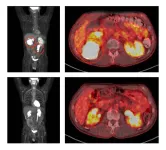(Press-News.org) Bottom Line: Cancer survivors who identify as lesbian, gay, bisexual, transgender, queer, or anything other than straight and cisgender (LGBTQ+) experience more chronic health conditions, disabilities, and other physical and cognitive limitations than non-LGBTQ+ cancer survivors; however, the prevalence of most conditions was highest among transgender or gender non-conforming (TGNC) individuals.
Journal in Which the Study was Published: Cancer Epidemiology, Biomarkers & Prevention, a journal of the American Association for Cancer Research (AACR)
Author: Austin R. Waters, MSPH, a doctoral candidate in health policy and management at the UNC Gillings School of Global Public Health in Chapel Hill, North Carolina and a predoctoral fellow at the Lineberger Comprehensive Cancer Center, University of North Carolina at Chapel Hill
Background: Prior research shows cancer survivors are more likely to have chronic diseases such as diabetes, kidney disease, liver disease, COPD, and heart disease compared to those who have never been diagnosed with cancer. Meanwhile, LGBTQ+ individuals, who represent about 7.1% of the U.S. population, have been found to face health disparities due to stigma and other social determinants of health. But few national samples that differentiate between cisgender and transgender identities have been used to study disparities among LGBTQ+ cancer survivors for chronic health conditions, according to Waters.
“Thinking about how LGBTQ+ cancer survivors’ health compares to non-LGBTQ+ cancer survivors’ is an important question because it begins to disentangle the driving forces behind inequities,” Waters said. “Notably, our analysis revealed that even when controlling for factors such as smoking status and income—factors known to be associated with poor health—LGBTQ+ cancer survivors continued to have higher odds of most chronic health conditions and other limitations.”
How the Study was Conducted: Waters and colleagues used data from the Behavioral Risk Factor Surveillance System (BRFSS), a phone survey system managed by the Centers for Disease Control and Prevention, collected in 2020, 2021, or 2022 from 23 states that administered questionnaires about sexual orientation and gender identity as well as cancer survivorship. Of 40,990 cancer survivors, 1,715 were LGBTQ+, including 638 lesbian or gay individuals, 551 bisexuals, and 458 who identified as another non-heterosexual sexual orientation, such as queer, pansexual, or asexual. Of the 114 TGNC cancer survivors, 38 identified as transgender men, 43 as transgender women, and 33 as gender non-conforming. Overall, the LGBTQ+ cancer survivors were significantly more racially and ethnically diverse, had a lower household income, and were younger both at the time of the survey and at diagnosis of their cancer.
Participants were asked to reply “yes” or “no” if they were “ever told” they had chronic health conditions such as angina or heart disease, asthma, COPD, depressive disorder, kidney disease, stroke, or diabetes as well as disabilities and physical limitations such as hearing disability, vision disability, difficulty walking, difficulty dressing, or difficulty running errands, or cognitive limitations such as serious difficulty concentrating, remembering, or making decisions due to any physical, mental, or emotional condition. Waters and colleagues compared results between LGBTQ+ and non-LGBTQ+ cancer survivors. They also broke the results down by examining TGNC and cisgender lesbian, gay, and bisexual (LGB) cancer survivors in comparison to non-LGBTQ+ cancer survivors and controlled for factors including age, race and ethnicity, smoking status, and education and household income.
Results: When adjusted for age, race and ethnicity, smoking status, and education and household income, LGBTQ+ cancer survivors overall had higher odds ratios of reporting asthma, depressive disorder, kidney disease, stroke, diabetes, vision disabilities, cognitive limitations, difficulty walking, difficulty dressing, and difficulty running errands compared to non-LGBTQ+ cancer survivors. The odds for TGNC cancer survivors, however, were substantially higher for most outcomes compared to non-TGNC survivors, with increased odds ranging from 2.34 to 6.03. The lone exception was depressive disorder. When adjusted for age, TGNC survivors also had a higher prevalence of most health conditions compared to LGB survivors except for depressive disorder as well as cognitive limitations.
Author’s Comments: “Transgender and gender non-conforming individuals are some of the most marginalized people in the LGBTQ+ community and are known to experience barriers to healthcare discrimination, more exclusion, more violence, and other factors than LGB individuals,” Waters said. “Our study highlights the challenges TGNC cancer survivors face and the need for TGNC individuals, as well as all other LGBTQ+ cancer survivors, to be prioritized in care across the continuum.”
Waters said future studies will begin to explore how some of these outcomes, such as depression and cognitive limitations, interplay with financial well-being and the ability to work after cancer to identify ways to better support LGBTQ+ survivors throughout the care process.
“While interventions like LGBTQ+-specific prehabilitation or LGBTQ+ patient navigators may minimize some inequities, ultimately societal and policy changes such as non-discrimination laws, affordable housing, and affordable health care are needed to completely address such disparities,” he said.
Study Limitations: Limitations of this study include a smaller sample of LGBTQ+ individuals in BRFSS compared to national samples, which could indicate that participants were not comfortable disclosing information about sexual orientation or gender identity or that LGBTQ+ individuals were less likely to respond to BRFSS. Additionally, cancer survivorship and sexual and gender identity survey modules are optional for states, which means the experiences of cancer survivors in states that did not elect to include this information are not reflected. The cross-sectional design of the study could have also resulted in a cohort of healthier cancer survivors with less severe disease or treatment. Further, potential recall errors are possible due to the self-reported status of cancer and chronic conditions. The study also lacks information about cancer treatments and pack-years for smokers, which may have further explained the findings.
Funding & Disclosures: Funding for the study was provided by the Cancer Care Quality Training Program at the Lineberger Comprehensive Cancer Center and the National Cancer Institute. Waters declares no conflicts of interest.
END
Among cancer survivors, LGBTQ+ individuals report higher prevalence of chronic health conditions, disabilities, other limitations
Transgender or gender non-conforming cancer survivors had higher odds of most conditions compared to cisgender cancer survivors
2024-06-20
ELSE PRESS RELEASES FROM THIS DATE:
Improving crops with laser beams and 3D printing
2024-06-20
A demonstration of how new technologies can be used in 21st century crop breeding comes from just published research that combines Laser Scanning and 3D printing to create a detailed 3D model of a sugar beet plant. Taking the next step beyond having genetic information to guide intelligent breeding, the 3D plant models here capture the essential characteristics of the above-ground parts of the sugar beet plant and can be used for AI-assisted crop improvement pipelines. The sugar beet plant models are reproducible and fit for field use. All the research information, data, methodology, as well as the 3D printing files are freely ...
Government’s failure to fortify all flour and rice with sufficient folic acid will lead to avoidable birth defects, warns expert
2024-06-20
The UK government’s failure to fortify all flour and rice with the vitamin folic acid “will result in more deaths and birth defects every year that could have been prevented,” argues Professor Sir Nicholas Wald in The BMJ today.
He warns that the current government’s proposal to fortify only one type of flour (non-wholemeal wheat flour) at an inadequate level will prevent only about 20% of neural tube defects, much less than the approximate 80% that could be prevented with fully effective fortification.
“What the government has done is a useful ...
Walking brings huge benefits for low back pain, study finds
2024-06-20
Adults with a history of low back pain went nearly twice as long without a recurrence of their back pain if they walked regularly, a world-first study has found.
About 800 million people worldwide have low back pain, and it is a leading cause of disability and reduced quality of life.
Repeated episodes of low back pain are also very common, with seven in 10 people who recover from an episode going on to have a recurrence within a year.
Current best practice for back pain management and prevention suggests the combination of ...
Study finds one copy of protective genetic variant helps stave off early-onset Alzheimer’s disease
2024-06-19
KEY TAKEAWAYS
An international team, including researchers from Mass General Brigham, has been searching for protective genetic variants in a family that includes more than 1,000 individuals who are genetically predisposed to develop early onset Alzheimer’s disease in their 40s.
Previously, the researchers identified the “Christchurch variant” as potentially protective against Alzheimer’s based on one family member who had two copies of this variant and was expected to develop dementia in her ...
Combination targeted treatment produces lasting remissions in people with resistant aggressive B-cell lymphoma
2024-06-19
Embargoed for Release
Wednesday, June 19, 2024
5:00 p.m. ET Contact: NCI Press Office
240-760-6600
NCIPressOfficers@nih.gov
NOTE: A virtual briefing is scheduled for Tuesday, June 18, 2024, at 1:00 p.m. ET. Details below.
Researchers at the National Institutes of Health (NIH) have developed a non-chemotherapy treatment regimen that is achieving full remissions for some people with aggressive B-cell lymphoma that has come back or is no longer responding to standard treatments. The five-drug combination targets multiple molecular pathways that diffuse large B-cell lymphoma (DLBCL) tumors use to survive.
In ...
Common prostate drugs tied to lower risk of dementia with lewy bodies
2024-06-19
EMBARGOED FOR RELEASE UNTIL 4 P.M. ET, WEDNESDAY, JUNE 19, 2024
MINNEAPOLIS – Certain drugs used to treat urinary symptoms due to an enlarged prostate may be associated with a reduced risk of dementia with Lewy bodies, according to a study published in the June 19, 2024, online issue of Neurology®, the medical journal of the American Academy of Neurology. Dementia with Lewy bodies is a progressive neurodegenerative disorder that can cause memory and thinking issues, movement problems and issues such as hallucinations.
The results do not prove that these drugs reduce the risk of dementia ...
Drugs for enlarged prostate may also protect against dementia with Lewy bodies
2024-06-19
A new study suggests that certain drugs commonly used to treat enlarged prostate may also decrease the risk for dementia with Lewy bodies (DLB). This observational finding may seem surprising, but it mirrors previous work by the University of Iowa Health Care team that links the drugs to a protective effect in another neurodegenerative condition–Parkinson's disease.
The UI researchers think that a specific side effect of the drugs targets a biological flaw shared by DLB and Parkinson’s disease, as well as other neurodegenerative ...
Titan’s lakes may be shaped by waves
2024-06-19
Titan, Saturn’s largest moon, is the only other planetary body in the solar system that currently hosts active rivers, lakes, and seas. These otherworldly river systems are thought to be filled with liquid methane and ethane that flows into wide lakes and seas, some as large as the Great Lakes on Earth.
The existence of Titan’s large seas and smaller lakes was confirmed in 2007, with images taken by NASA’s Cassini spacecraft. Since then, scientists have pored over those and other images for clues to the moon’s mysterious ...
YALE EMBARGOED NEWS: Family psychiatric history: Effects on siblings of children with autism
2024-06-19
New Haven, Conn. — Children who have an older sibling with autism spectrum disorder (autism) are at greater risk of developmental vulnerabilities if they also have other relatives with neurodevelopmental or psychiatric conditions, according to a new study from the Yale Child Study Center.
Researchers found that the siblings of children with autism had an increase in the severity of social and communication difficulties — which are common in autism — if they had relatives with conditions such as schizophrenia or anxiety. Family histories of anxiety and intellectual disability were also associated ...
New technology provides electrifying insights into how catalysts work at the atomic level
2024-06-19
A team led by Lawrence Berkeley National Laboratory (Berkeley Lab) has invented a technique to study electrochemical processes at the atomic level with unprecedented resolution and used it to gain new insights into a popular catalyst material. Electrochemical reactions – chemical transformations that are caused by or accompanied by the flow of electric currents – are the basis of batteries, fuel cells, electrolysis, and solar-powered fuel generation, among other technologies. They also drive biological processes such as photosynthesis ...
LAST 30 PRESS RELEASES:
Medicare patients get different stroke care depending on plan, analysis reveals
Polyploidy-induced senescence may drive aging, tissue repair, and cancer risk
Study shows that treating patients with lifestyle medicine may help reduce clinician burnout
Experimental and numerical framework for acoustic streaming prediction in mid-air phased arrays
Ancestral motif enables broad DNA binding by NIN, a master regulator of rhizobial symbiosis
Macrophage immune cells need constant reminders to retain memories of prior infections
Ultra-endurance running may accelerate aging and breakdown of red blood cells
Ancient mind-body practice proven to lower blood pressure in clinical trial
SwRI to create advanced Product Lifecycle Management system for the Air Force
Natural selection operates on multiple levels, comprehensive review of scientific studies shows
Developing a national research program on liquid metals for fusion
AI-powered ECG could help guide lifelong heart monitoring for patients with repaired tetralogy of fallot
Global shark bites return to average in 2025, with a smaller proportion in the United States
Millions are unaware of heart risks that don’t start in the heart
What freezing plants in blocks of ice can tell us about the future of Svalbard’s plant communities
A new vascularized tissueoid-on-a-chip model for liver regeneration and transplant rejection
Augmented reality menus may help restaurants attract more customers, improve brand perceptions
Power grids to epidemics: study shows small patterns trigger systemic failures
Computational insights into the interactions of andrographolide derivative SRJ09 with histone deacetylase for the management of beta thalassemia
A genetic brake that forms our muscles
CHEST announces first class of certified critical care advanced practice providers awarded CCAPP Designation
Jeonbuk National University researchers develop an innovative prussian-blue based electrode for effective and efficient cesium removal
Self-organization of cell-sized chiral rotating actin rings driven by a chiral myosin
Report: US history polarizes generations, but has potential to unite
Tiny bubbles, big breakthrough: Cracking cancer’s “fortress”
A biological material that becomes stronger when wet could replace plastics
Glacial feast: Seals caught closer to glaciers had fuller stomachs
Get the picture? High-tech, low-cost lens focuses on global consumer markets
Antimicrobial resistance in foodborne bacteria remains a public health concern in Europe
Safer batteries for storing energy at massive scale
[Press-News.org] Among cancer survivors, LGBTQ+ individuals report higher prevalence of chronic health conditions, disabilities, other limitationsTransgender or gender non-conforming cancer survivors had higher odds of most conditions compared to cisgender cancer survivors




